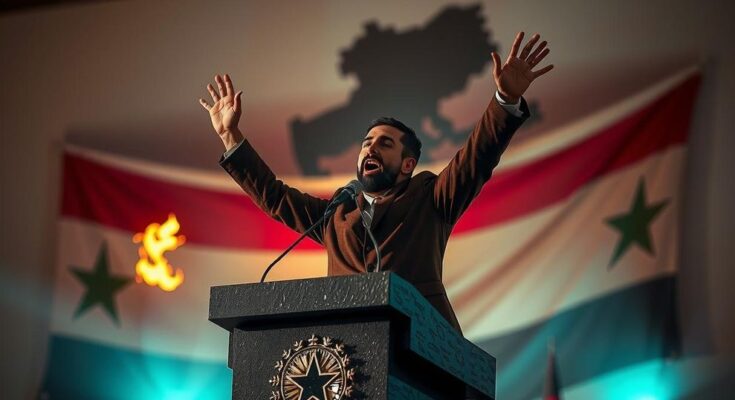Abu Mohammad al-Jolani, the leader of Hayat Tahrir al-Sham, delivered a noteworthy victory speech at the Umayyad Mosque in Damascus. He emphasized sectarian unity, a rejection of Iranian influence, and a commitment to restoring Syria’s standing while addressing Western interests. This speech signifies his strategic approach to consolidating his power in the new geopolitical landscape of Syria.
Abu Mohammad al-Jolani, the leader of the Syrian rebel group Hayat Tahrir al-Sham (HTS), recently delivered a significant victory speech at the historic Umayyad Mosque in Damascus, marking a pivotal moment in his ascent. Transitioning from an early role as an Al-Qaeda fighter to a prominent commander advocating for sectarian unity, he articulated a message aimed at various stakeholders, including Iranian authorities and Western powers.
Jolani emphasized that his victory represents a triumph for the entire Islamic community, crediting the sacrifices of martyrs and the suffering endured by the Syrian populace. His selection of the Umayyad Mosque for this proclamation underlines a deliberate choice of a revered site to convey his thoughts. His statements challenge historical sectarian divisions, positioning his Sunni identity against Assad’s Alawite regime, yet calling for a collective overcoming of such divisions.
Furthermore, Jolani targeted Iranian influence in Syria, suggesting an end to Tehran’s dominance and asserting that its proxy operations within the region are no longer tenable. This rhetoric is also strategically directed toward American and Israeli interests, with Jolani signaling an awareness of the geopolitical landscape and a desire for legitimacy. In prior statements, he indicated to U.S. leaders, including President Biden, his intention to distance HTS from the brutality associated with other jihadist factions.
In addition, Jolani addressed concerns regarding Syria’s reputation as a narco-state, promising to restore law and order and sever ties with the criminal enterprises that have flourished under Assad’s governance. His discourse reflects a dual focus on immediate survival as a leader and the broader implications of his regime’s evolution.
Overall, Jolani’s speech encapsulates his strategic positioning in a volatile region, advocating for a cleaner and more unified Syria while aligning himself with influential power brokers capable of affecting his regime’s future stability.
The Syrian conflict has undergone significant transformations since its inception. Leaders such as Abu Mohammad al-Jolani have navigated a complex landscape, influenced by diverse sectarian, regional, and international forces. Jolani’s evolution from an Al-Qaeda affiliate to a prominent rebel commander symbolizes broader shifts within the Syrian opposition, particularly regarding ideological narratives that appeal to the local population and potential external allies. His recent emergence in Damascus represents a critical turning point amid ongoing tensions with the Assad regime as well as other regional actors.
Abu Mohammad al-Jolani’s recent address at the Umayyad Mosque stands as a testament to his strategic recalibrations within a fragmented Syria. By addressing the sacrifice of the Syrian people and challenging Iranian influence, he aims to consolidate power and garner support from both local and international actors. His broader message reflects an intention to navigate the complexities of the political landscape while emphasizing the need for unity and reform in post-conflict Syria.
Original Source: www.cnn.com




